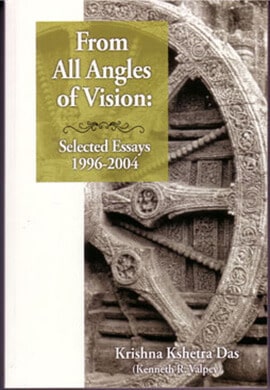To take up the academic study of religion after being a ‘Hare Krishna’ missionary-monk in central Europe for twenty-three years was, for me, a rather drastic change of vocation. Yet from another perspective I merely resumed where I had left off as a twenty-one-year-old, a college drop-out ready to drop back in almost a quarter century later. Nor is it entirely unusual nowadays to see ‘mature students’ hunched amidst learners half their age in American college classrooms. I wasn’t so odd after all, and I found that my added years and a disciplined semi-monastic lifestyle had given me advantages: First, I had an eagerness to learn that was not clouded by the distractions and ulterior motives of an eighteen-year-old college student, and second, perhaps due to life experience, I had the makings for being able to write decent academic term papers and essays.
The essays in this volume are, as I see it, my record of these years of academic catching-up. The immediate motivation for writing was not entirely exalted: Several of these essays served to fulfill class assignments leading to grades, course credits, and eventually degrees. Yet my instructors several times voiced appreciation for my work, indicating that these writings could be of value beyond the limited purpose of academic assessment. Still these exercises are far from the mark of either cutting-edge scholarship or high-level writing finesse (and I’m leaving them ‘as is’, resisting the temptation to revise or ‘fix’ them), and indeed to venture a volume of ‘collected essays’ is clearly to foist an after-thought into the public sphere, hardly as a cohesive body of intellection. Still, with the encouragement of friends the urge prevails to share something of what I digested from the reading of countless books and articles or heard in classrooms from professors, as I reflected on how these many streams of thought might relate to or challenge the tradition of Krishna-bhakti I have made my spiritual home since soon after setting aside formal study back in 1972.
A remote comparison might suggest itself between this volume and one by my dear friend, the late Tamal Krishna Goswami. His A Hare Krishna at Southern Methodist University (Pundits Press, 1998) is, as is clear from the title, similarly a collection of essays written by a Krishna-devotee-cum-student during his college days. Indeed, we both returned to college at almost the same time, and we both majored in Religious Studies, frequently comparing notes on the challenges we faced. Beyond these externals, though, the comparison becomes strained. Each of Goswami’s essays reflect – frequently in an autobiographical mode – closely and explicitly on themes related to the theology, life and culture of ‘Krishna consciousness’ or Krishna devotionalism upon which our mutual guru, A. C. Bhaktivedanta Swami Prabhupada, based all his teachings. The essays in this present volume are of a different character. In some essays I attempt to explore themes not always explicitly connected to standard Vaishnava modes of discourse but which are nevertheless (at least in my mind) of relevance in relation to spiritual life.
These essays serve to explore the Vaishnava tradition or specific concerns within the Vaishnava tradition from a broader public intellectual context. Five such essays are focussed on Christianity, because they were products of courses in Christianity I attended (in Graduate Theological Union, Berkeley, and in Oxford University). Other essays are indeed direct discussions of Vaishnava tradition or, more specifically, of Vaishnava tradition as represented in my spiritual home, the International Society for Krishna Consciousness (ISKCON), but they are presented in a more expository mode than Goswami’s essays.
